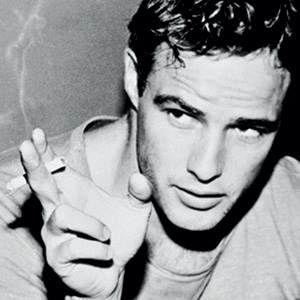

An actor’s a guy, who if you ain’t talking about him, ain’t listening.”
This is just one example of many quotes culled from a basket of cassette tapes, the acting legend Marlon Brando made as personal therapy. These nighttime musings of the greatest and most influential American actor of the 20th century come to us courtesy of director Stevan Riley’s new film, Listen to Me Marlon.
Accompanying visuals combine news footage, interviews and impressionist camera views of the Southern California compound where Brando hid from the world. Also supplementing the narration, leftover from some digital experiment made years ago, is an early 3D animated sampling of Brando’s head as he speaks.
Brando had a battering father and a sensitive mother who was, he claims, the town drunk. Crime, murder and suicide took its toll among his children. Brando’s contempt for the demands of his profession added to his strain—he hated being thought of as a “mechanical doll.”
“You know who you were going to get when you went to the movies,” he muses. “Actors who were the same in every role.” Brando was determined to make the element of surprise an essential component in his performances. He considers other ways his art functioned: acting as boxing, acting as a search for justice.
The deadly paternal rumble of Don Corleone in The Godfather, or the slurred, psychedelic muttering of Colonel Kurtz in Apocalypse Now, were Brando’s strange gists to the world. Brando brought an utterly masculine attack to such films as Last Tango in Paris, or the feline, mincing diction in his English parts from Fletcher Christian to Superman’s father. In odd parts, he’d sweeten up this feminine side, just to shock the machos.
As he tells it to himself, Brando’s success seems a blur, compared to places that seemed real to him, such as the American West and Tahiti. What he loved to think about were the days when he could ride his motorcycle all over New York in the dead of night. These night rides were relief from the ordeal from playing Stanley Kowalski in A Streetcar Named Desire—”I absolutely hate that kind of person,” he says of Kowalski. Indeed, Brando was a vessel for elements so corrosive that it’s no surprise that there was some cracking.
Conflict isn’t just the essence of movies, it’s also the essence of movie making. There isn’t a big movie Brando didn’t warp to his own personality. He made Don Corleone an icon of paternal anguish, and there’s an echo of the Don’s concern in the way Brando worries about his children here. Brando’s Kowalski bends the 1951 film of Streetcar in his favor; in this film, he’s a class clown disrupting Blanche’s school teacher-ish lessons about truth and beauty.
Flouting aesthetics was part of Brando’s assault on his craft, perhaps one explanation for his obesity. At one point, Brando impersonates a piece of pie, calling to him from the inside of the fridge: “C’mon, Marlon, be a pal. It’s cold in hereÉ.”
“Free yourself from the cult of Marlon Brando,” New Yorker critic Richard Brody recently thundered. Brody maintains that the theatrical glaze on Brando’s remarkable natural presence is what fascinates your ordinary critics, leading them to ignore the raw power underneath. Brody uses the Shakespearean expression, “to gild the lily” in order to criticize the Shakespearean qualities in Brando’s work. In Listen to Me Marlon, Brando recites Macbeth as his massive skull is woven out of pixels. And his manipulative, effete Mark Anthony in the 1956 Julius Caesar is indelible acting.
If anything, the cult of Brando needs more devotees, and there needs to be a restoration of the film he directed in Monterey, One Eyed Jacks.
Still, Brody is right in this rebuttal to a Terrence Rafferty essay wrongly bemoaning the quality of today’s actors. We still have Brando’s influence to thank for how fine screen acting is today. To be an actor, you don’t have to be well-born or well-read; it’s a gift for observation and intuition and fearlessness that matters. What Brando had, young actors are still trying to grasp—both the aloofness and the need.
NR; 95 Mins.



